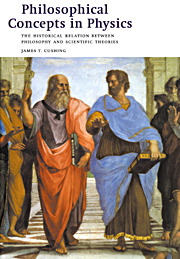 Philosophical Concepts in Physics
Philosophical Concepts in Physics Book contents
- Frontmatter
- Contents
- Preface
- Copyright acknowledgments
- PART I The scientific enterprise
- PART II Ancient and modern models of the universe
- PART III The Newtonian universe
- PART IV A perspective
- PART V Mechanical versus electrodynamical world views
- PART VI The theory of relativity
- PART VII The quantum world and the completeness of quantum mechanics
- 19 The road to quantum mechanics
- 20 Copenhagen quantum mechanics
- 21 Is quantum mechanics complete?
- PART VIII Some philosophical lessons from quantum mechanics
- PART IX A retrospective
- Notes
- General references
- Bibliography
- Author index
- Subject index
21 - Is quantum mechanics complete?
Published online by Cambridge University Press: 05 June 2012
- Frontmatter
- Contents
- Preface
- Copyright acknowledgments
- PART I The scientific enterprise
- PART II Ancient and modern models of the universe
- PART III The Newtonian universe
- PART IV A perspective
- PART V Mechanical versus electrodynamical world views
- PART VI The theory of relativity
- PART VII The quantum world and the completeness of quantum mechanics
- 19 The road to quantum mechanics
- 20 Copenhagen quantum mechanics
- 21 Is quantum mechanics complete?
- PART VIII Some philosophical lessons from quantum mechanics
- PART IX A retrospective
- Notes
- General references
- Bibliography
- Author index
- Subject index
Summary
When we are presented with apparently bizarre properties of microsystems governed by quantum mechanics (as in our discussion of the double-slit experiment in the previous chapter), we naturally ask whether it might be possible to find another theory, or at least another story to go with the equations, that would make more sense to us. We might seek a theory and a view of fundamental physical processes that would accord more with our classically based, everyday common sense. This typically takes the form of the question of the possibility of the existence of a more detailed description of atomic processes than that afforded by the wave function (that is, by the Copenhagen interpretation of the previous chapter). In this chapter we discuss some of the central interpretive problems of the Copenhagen version of quantum mechanics. Then, in the next two chapters, we look at the severe, general restrictions that are placed on any such completion of quantum mechanics and at one particular extension of quantum mechanics. First, though, we begin here with the struggle that ensued over the status of causality in quantum theory.
THE COMPLETENESS OF QUANTUM MECHANICS
Although the Heisenberg uncertainty principle (Section 20.4) and the lack of absolute predictive power are an inherent feature of quantum mechanics, there have been attempts to preserve an in principle completely deterministic structure for physics. Even classically, in a macroscopic sample of gas there are so many molecules that it would be hopeless, as a practical matter, to predict the future locations of all these molecules from Newton's laws of motion.
- Type
- Chapter
- Information
- Philosophical Concepts in PhysicsThe Historical Relation between Philosophy and Scientific Theories, pp. 305 - 316Publisher: Cambridge University PressPrint publication year: 1998


